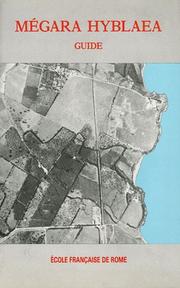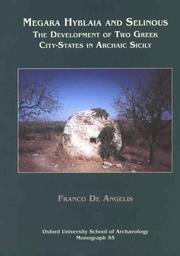| Listing 1 - 7 of 7 |
Sort by
|

ISBN: 2728300534 2728307229 9782728300532 9782728307227 Year: 1983 Volume: 1/5 Publisher: Rome Ecole française de Rome
Abstract | Keywords | Export | Availability | Bookmark
 Loading...
Loading...Choose an application
- Reference Manager
- EndNote
- RefWorks (Direct export to RefWorks)
Ce volume a l'ambition de rassembler les connaissances actuellement disponibles sur l'espace urbain de soixante hectares de l'une des premières villes conçues en Occident avec des règles d'urbanisme. Fondée au VIIIe siècle avant J.-C. sur la côte de la Sicile orientale, à vingt kilomètres au nord de Syracuse, Mégara Hyblaea a été abandonnée deux siècles plus tard par ses habitants, déportés par le tyran de Syracuse. Le site est aujourd'hui un îlot protégé au milieu de la grande zone industrielle du golfe d'Augusta. Depuis le XVIe siècle, les érudits puis les archéologues ont compris son importance et, depuis 1949, l'École française de Rome y est engagée dans une recherche conduite dans le cadre d'une collaboration étroite avec la Surintendance italienne, chargée de la protection du site. Les résultats présentés ici mettent en évidence les conditions concrètes qui ont permis de « penser » la ville puis de la dessiner sur le terrain, enfin de l'occuper avec ses rues, ses quartiers, ses fortifications. Ils permettent aussi d'entrevoir les choix du groupe des fondateurs et le fonctionnement social de la cité. Ils montrent surtout l'importance du lot attribué à chaque chef de famille avec son habitat, sa cour et son puits. Les auteurs montrent enfin quels sont les savoirs théoriques et techniques qui ont été mobilisés pour concevoir cette « ville nouvelle », fille de la pensée grecque archaïque, bien avant Hippodamos de Milet
Megara Hyblaea (Extinct city) --- -Megara Hyblaea (Ancient city) --- Megara Hyblaia (Extinct city) --- Italy --- Sicily (Italy) --- Antiquities. --- Antiquities --- -Antiquities. --- Sicily (Italy) - Antiquities --- Italy - Antiquities
Book
ISBN: 9782380500271 Year: 2021 Publisher: Naples : Centre Jean Bérard,
Abstract | Keywords | Export | Availability | Bookmark
 Loading...
Loading...Choose an application
- Reference Manager
- EndNote
- RefWorks (Direct export to RefWorks)
Architecture, Domestic --- Excavations (Archaeology) --- City planning --- History --- Megara Hyblaea (Extinct city) --- Buildings, structures, etc. --- Cities and towns, Ancient --- Architecture, Hellenistic --- Urbanisme --- Colonies grecques --- Architecture hellénistique --- Megara Hyblaea (ville ancienne).
Book
ISBN: 9783034304610 3034304617 1306932726 3035202613 Year: 2014 Publisher: Bern Peter Lang
Abstract | Keywords | Export | Availability | Bookmark
 Loading...
Loading...Choose an application
- Reference Manager
- EndNote
- RefWorks (Direct export to RefWorks)
This book aims to offer a new interpretation of the settlement movement initiated by the city of Megara in archaic times. It shows the role of conflict between the aristocratic families for the departure of the Megarians and reveals the role of the heritage of the metropolis in the creation of institutions of colonial cities.
Megara (Greece) --- Mégare (Grèce) --- Antiquities --- History --- Antiquités --- Histoire --- Greeks --- Antiquities. --- Megara Hyblaea (Extinct city) --- Selinus (Extinct city) --- History. --- Ethnology --- Mediterranean race --- Marinella Selinunte (Extinct city) --- Selinous (Extinct city) --- Selinunte (Extinct city) --- Italy --- Megara Hyblaea (Ancient city) --- Megara Hyblaia (Extinct city) --- nomima --- propontis --- greek colonization --- judiciaries --- civil subdivisions --- megara --- sicily --- pontus

ISBN: 0947816569 9780947816568 Year: 2003 Publisher: Oxford Oxford university school of archaeology
Abstract | Keywords | Export | Availability | Bookmark
 Loading...
Loading...Choose an application
- Reference Manager
- EndNote
- RefWorks (Direct export to RefWorks)
Greeks --- Grecs --- Megara Hyblaea (Extinct city) --- Selinus (Extinct city) --- Sicily (Italy) --- Magna Graecia (Italy) --- Megara Hyblea (Ville ancienne) --- Sélinonte (Italie : Ville ancienne) --- Sicile (Italie) --- Grande-Grèce --- Antiquities. --- Antiquités --- Ethnology --- Mediterranean race --- Marinella Selinunte (Extinct city) --- Selinous (Extinct city) --- Selinunte (Extinct city) --- Italy --- Megara Hyblaea (Ancient city) --- Megara Hyblaia (Extinct city) --- Magna Grecia (Italy) --- Greece --- Antiquities --- Colonies
Book

ISSN: 02235099 ISBN: 9782728312429 2728312427 9782728312825 2728312826 Year: 1964 Volume: 1/7 Publisher: Rome : Ecole française de Rome,
Abstract | Keywords | Export | Availability | Bookmark
 Loading...
Loading...Choose an application
- Reference Manager
- EndNote
- RefWorks (Direct export to RefWorks)
Art, Greek --- Excavations (Archaeology) --- Tombs --- Art grec --- Fouilles (Archéologie) --- Tombes --- Megara Hyblaea (Extinct city) --- Sicily (Italy) --- Megara Hyblea (Ville ancienne) --- Sicile (Italie) --- Antiquities --- Antiquités --- Riti funebri - Megara Iblea - Antichità. --- Scavi archeologici - Megara Iblea. --- Megara Iblea - Ritrovamenti archeologici. --- Archéologie funéraire --- Rites et cérémonies funéraires --- Mobilier funéraire --- Megara Hyblaea (ville ancienne). --- Fouilles archéologiques --- Antiquités. --- --Italie --- --Megara Hyblea, ville ancienne --- --Fouilles archéologiques --- --Art, Greek --- Italie --- Megara Hyblea, ville ancienne
Book
ISBN: 9782918887713 2918887714 2918887722 Year: 2016 Publisher: Naples : Centre Jean Bérard,
Abstract | Keywords | Export | Availability | Bookmark
 Loading...
Loading...Choose an application
- Reference Manager
- EndNote
- RefWorks (Direct export to RefWorks)
Les quatre chapitres qui composent le volume correspondent aux quatre conférences présentées au Collège de France en 2014. Y sont examinées les fondations de Pithécusses et de Cumes ; de Mégara Hyblaea dans ses rapports avec les cités chalcidiennes de la Sicile orientale ; de Sybaris dans ses relations avec les populations indigènes de l’arrière-pays. Enfin, la formation urbaine de Pompéi, fondée par les communautés italiques de la vallée du Sarno, est analysée pour comparer l’établissement des cités grecques avec l’implantation d’une ville italique. Les interprétations se fondent à la fois sur une exégèse des sources littéraires anciennes et sur l’étude du matériel archéologique pertinent, actuellement disponible. Ces sources de nature diverse sont traitées selon les méthodes propres à chaque discipline ; la bibliographie moderne est également discutée. Le livre offre ainsi une vision actualisée des sujets traités à l’usage des étudiants et constitue une base pour relancer la discussion Nei quattro capitoli che compongono il volume, corrispondenti alle quattro lezioni tenute al Collège de France nel 2014, si esaminano le fondazioni di Pithecusa e Cuma; di Megara Hyblea nel quadro delle poleis calcidesi della Sicilia orientale; di Sibari, in rapporto con le preesistenti popolazioni indigene dell’Enotria. Infine, si discutono i modi della formazione urbana di Pompei, impiantata dalle società italiche della valle del fiume Sarno: anche allo scopo di porre a riscontro le poleis greche con una città italica. Le argomentazioni che vengono proposte si fondano sia su in'interpretazione delle fonti letterarie antiche relative ai diversi temi discussi sia sull'ordinamento dei materiali archeologici, finora disponibili, che si siano ritenuti utili alla discussione. Queste evidenze, di natura differente fra loro, sono trattate iuxta propria principia. Viene, inoltre, menzionata e discussa la moderna bibliografia pertinente. In tal modo si presume di aver offerto un panorama…
Excavations (Archaeology) --- Greeks --- Architecture, Ancient --- Cities and towns, Ancient --- Fouilles (Archéologie) --- Grecs --- Architecture antique --- Villes antiques --- Colonization --- Colonisation --- Pompeii (Extinct city) --- Megara Hyblaea (Extinct city) --- Sybaris (Extinct city) --- Pompéi (Ville ancienne) --- Megara Hyblea (Ville ancienne) --- Sybaris (Ville ancienne) --- Villes --- Pithécusses (ville ancienne) --- Antiquité --- Origines --- Antiquités --- Pompéi (ville ancienne) --- Megara Hyblaea (ville ancienne) --- Sybaris (ville ancienne) --- Megara Hyblea (ville ancienne) --- Fouilles (Archéologie) --- Pompéi (Ville ancienne) --- Antiquité. --- Pithécusses (ville ancienne) --- Pompéi (ville ancienne) --- Antiquités --- History & Archaeology --- archéologie --- colonies grecques --- Grande Grèce --- Italie du Sud grecque --- protohistoire --- peuples italiques --- archaeology --- Magna Graecia --- Greek Southern Italy --- Cumae --- Megara Hyblaea --- Pithekoussai --- Sicily --- Sybaris --- Pompeii --- Greek colonization --- Italic tribes --- Magna Graecia (Italy) --- Antiquities. --- Magna Grecia (Italy) --- Greece --- Colonies
Book
ISBN: 9781770962231 1770962239 Year: 2018 Publisher: Montréal McGill University Library and Archives
Abstract | Keywords | Export | Availability | Bookmark
 Loading...
Loading...Choose an application
- Reference Manager
- EndNote
- RefWorks (Direct export to RefWorks)
Situated near the main traffic artery in Central Greece and surrounded by poleis that were more powerful, the ancient city-state of Megara was often a punching bag of others. In neighbouring Athens in particular, the Megarians were subject to all sorts of slander and expressions of chauvinism. The people of Megara, by default, had their own assessment of the world and their role in it. A highway to others, the Megarid, was a rich source of meaning and orientation to its inhabitants. This local backdrop, often misunderstood as petty or irrelevant, constituted a unique local discourse environment. Rather than telling a narrative history of Megara – unravelling its local history, as it were –, this volume delves into the local discourse of this ancient city. The various contributions all shed light on the prevailing identity of place, on what it meant to be from Megara. In doing so, the book unpacks the vibrant local life in a Greek city-state. In their endeavour to break the code of a local discourse and recreate its environment, the editors and authors also invite readers to rethink approximations toward the pluriverse of poleis in Greek Antiquity. -- from website
Greeks --- Ethnology --- Mediterranean race --- Antiquities --- Megara Hyblaea (Extinct city) --- Greece --- Sicily (Italy) --- Regione siciliana (Italy) --- Sikelia (Italy) --- Sycylia (Italy) --- Królestwo Sycylii (Italy) --- Sicilia (Italy) --- Sicile (Italy) --- Sicilian Regional Government --- Sicily --- Ṣiqillīyah (Italy) --- Sitsilyah (Italy) --- Sicily (Italy : Territory under Allied occupation, 1943-1947) --- Naples (Kingdom) --- al-Yūnān --- Ancient Greece --- Ellada --- Ellas --- Ellēnikē Dēmokratia --- Elliniki Dimokratia --- Grčija --- Grèce --- Grecia --- Gret︠s︡ii︠a︡ --- Griechenland --- Hellada --- Hellas --- Hellenic Republic --- Hellēnikē Dēmokratia --- Kingdom of Greece --- République hellénique --- Royaume de Grèce --- Vasileion tēs Hellados --- Xila --- Yaṿan --- Yūnān --- Ελληνική Δημοκρατία --- Ελλάς --- Ελλάδα --- Греция --- اليونان --- يونان --- 希腊 --- Megara Hyblaea (Ancient city) --- Megara Hyblaia (Extinct city) --- Italy --- Colonies --- E-books --- Conferences - Meetings
| Listing 1 - 7 of 7 |
Sort by
|

 Search
Search Feedback
Feedback About UniCat
About UniCat  Help
Help News
News